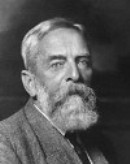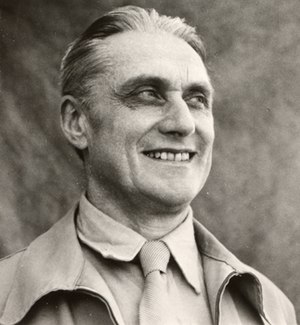Portal:Economics
Portal maintenance status: (December 2018)
|
Introduction
Economics (/ˌɛkəˈnɒmɪks, ˌiːkə-/) is a social science that studies the production, distribution, and consumption of goods and services.
Economics focuses on the behaviour and interactions of economic agents and how economies work. Microeconomics analyses what is viewed as basic elements within economies, including individual agents and markets, their interactions, and the outcomes of interactions. Individual agents may include, for example, households, firms, buyers, and sellers. Macroeconomics analyses economies as systems where production, distribution, consumption, savings, and investment expenditure interact, and factors affecting it: factors of production, such as labour, capital, land, and enterprise, inflation, economic growth, and public policies that have impact on these elements. It also seeks to analyse and describe the global economy. (Full article...)
Selected general articles
-
Image 1

Friedrich August von Hayek CH FBA (/ˈhaɪək/ HY-ək, German: [ˈfʁiːdʁɪç ˈʔaʊɡʊst fɔn ˈhaɪɛk] <phonos file="Yandexhayek.wav"></phonos>; 8 May 1899 – 23 March 1992), often referred to by his initials F. A. Hayek, was an Austrian-British academic who contributed to economics, political philosophy, psychology, and intellectual history. Hayek shared the 1974 Nobel Memorial Prize in Economic Sciences with Gunnar Myrdal for work on money and economic fluctuations, and the interdependence of economic, social and institutional phenomena. His account of how prices communicate information is widely regarded as an important contribution to economics that led to him receiving the prize.
During his teenage years, Hayek fought in World War I. He later said this experience, coupled with his desire to help avoid the mistakes that led to the war, drew him into economics. He earned doctoral degrees in law in 1921 and political science in 1923 from the University of Vienna. He subsequently lived and worked in Austria, Great Britain, the United States, and Germany. He became a British citizen in 1938. His academic life was mostly spent at the London School of Economics, later at the University of Chicago, and the University of Freiburg. He is widely considered a major contributor to the Austrian School of Economics. (Full article...) -
Image 2The neoclassical synthesis (NCS), or neoclassical–Keynesian synthesis is an academic movement and paradigm in economics that worked towards reconciling the macroeconomic thought of John Maynard Keynes in his book The General Theory of Employment, Interest and Money (1936) with neoclassical economics.
The neoclassical synthesis is a macroeconomic theory that emerged in the mid-20th century, combining the ideas of neoclassical economics with Keynesian economics. The synthesis was an attempt to reconcile the apparent differences between the two schools of thought and create a more comprehensive theory of macroeconomics. (Full article...) -
Image 3

François Quesnay (French: [fʁɑ̃swa kɛnɛ]; 4 June 1694 – 16 December 1774) was a French economist and physician of the Physiocratic school. He is known for publishing the "Tableau économique" (Economic Table) in 1758, which provided the foundations of the ideas of the Physiocrats. This was perhaps the first work attempting to describe the workings of the economy in an analytical way, and as such can be viewed as one of the first important contributions to economic thought. His Le Despotisme de la Chine, written in 1767, describes Chinese politics and society, and his own political support for enlightened despotism. (Full article...) -
Image 4Real business-cycle theory (RBC theory) is a class of new classical macroeconomics models in which business-cycle fluctuations are accounted for by real (in contrast to nominal) shocks. Unlike other leading theories of the business cycle, RBC theory sees business cycle fluctuations as the efficient response to exogenous changes in the real economic environment. That is, the level of national output necessarily maximizes expected utility, and governments should therefore concentrate on long-run structural policy changes and not intervene through discretionary fiscal or monetary policy designed to actively smooth out economic short-term fluctuations.
According to RBC theory, business cycles are therefore "real" in that they do not represent a failure of markets to clear but rather reflect the most efficient possible operation of the economy, given the structure of the economy. (Full article...) -
Image 5

Microeconomics analyzes the market mechanisms that enable buyers and sellers to establish relative prices among goods and services. Shown is a marketplace in Delhi.
Microeconomics is a branch of economics that studies the behavior of individuals and firms in making decisions regarding the allocation of scarce resources and the interactions among these individuals and firms. Microeconomics focuses on the study of individual markets, sectors, or industries as opposed to the economy as a whole, which is studied in macroeconomics.
One goal of microeconomics is to analyze the market mechanisms that establish relative prices among goods and services and allocate limited resources among alternative uses[citation needed]. Microeconomics shows conditions under which free markets lead to desirable allocations. It also analyzes market failure, where markets fail to produce efficient results. (Full article...) -
Image 6

Joseph Alois Schumpeter (German: [ˈʃʊmpeːtɐ]; February 8, 1883 – January 8, 1950) was an Austrian political economist. He served briefly as Finance Minister of Austria in 1919. In 1932, he emigrated to the United States to become a professor at Harvard University, where he remained until the end of his career, and in 1939 obtained American citizenship.
Schumpeter was one of the most influential economists of the early 20th century, and popularized the term "creative destruction", coined by Werner Sombart. (Full article...) -
Image 7
Herbert Alexander Simon (June 15, 1916 – February 9, 2001) was an American political scientist whose work also influenced the fields of computer science, economics, and cognitive psychology. His primary research interest was decision-making within organizations and he is best known for the theories of "bounded rationality" and "satisficing". He received the Turing Award in 1975 and the Nobel Memorial Prize in Economic Sciences in 1978. His research was noted for its interdisciplinary nature, spanning the fields of cognitive science, computer science, public administration, management, and political science. He was at Carnegie Mellon University for most of his career, from 1949 to 2001, where he helped found the Carnegie Mellon School of Computer Science, one of the first such departments in the world.
Notably, Simon was among the pioneers of several modern-day scientific domains such as artificial intelligence, information processing, decision-making, problem-solving, organization theory, and complex systems. He was among the earliest to analyze the architecture of complexity and to propose a preferential attachment mechanism to explain power law distributions. (Full article...) -
Image 8
Ragnar Anton Kittil Frisch (3 March 1895 – 31 January 1973) was an influential Norwegian economist known for being one of the major contributors to establishing economics as a quantitative and statistically informed science in the early 20th century. He coined the term econometrics in 1926 for utilising statistical methods to describe economic systems, as well as the terms microeconomics and macroeconomics in 1933, for describing individual and aggregate economic systems, respectively. He was the first to develop a statistically informed model of business cycles in 1933. Later work on the model, together with Jan Tinbergen, won the first Nobel Memorial Prize in Economic Sciences in 1969.
Frisch became dr.philos. with a thesis on mathematics and statistics at the University of Oslo in 1926. After his doctoral thesis, he spent five years researching in the United States at the University of Minnesota and Yale University. After teaching briefly at Yale from 1930–31, he was offered a full professorship in economics, which he declined after pressures by colleagues to return to the University of Oslo. After returning to Oslo, Frisch was first appointed by the King-in-Council as Professor of Economics and Statistics at the Faculty of Law, University of Oslo (then the Royal Frederick University) in 1931, before becoming leader of the newly founded Institute of Economics at the University of Oslo in 1932. He remained at the University of Oslo until his retirement in 1965. (Full article...) -
Image 9New classical macroeconomics, sometimes simply called new classical economics, is a school of thought in macroeconomics that builds its analysis entirely on a neoclassical framework. Specifically, it emphasizes the importance of rigorous foundations based on microeconomics, especially rational expectations.
New classical macroeconomics strives to provide neoclassical microeconomic foundations for macroeconomic analysis. This is in contrast with its rival new Keynesian school that uses microfoundations, such as price stickiness and imperfect competition, to generate macroeconomic models similar to earlier, Keynesian ones. (Full article...) -
Image 10
Adam Smith FRS FRSE FRSA (baptised 16 June [O.S. 5 June] 1723 – 17 July 1790) was a Scottish economist and philosopher who was a pioneer in the thinking of political economy and key figure during the Scottish Enlightenment. Seen by some as "The Father of Economics" or "The Father of Capitalism", he wrote two classic works, The Theory of Moral Sentiments (1759) and An Inquiry into the Nature and Causes of the Wealth of Nations (1776). The latter, often abbreviated as The Wealth of Nations, is considered his magnum opus and the first modern work that treats economics as a comprehensive system and as an academic discipline. Smith refuses to explain the distribution of wealth and power in terms of God's will and instead appeals to natural, political, social, economic, legal, environmental and technological factors and the interactions among them. Among other economic theories, the work introduced Smith's idea of absolute advantage.
Smith studied social philosophy at the University of Glasgow and at Balliol College, Oxford, where he was one of the first students to benefit from scholarships set up by fellow Scot John Snell. After graduating, he delivered a successful series of public lectures at the University of Edinburgh, leading him to collaborate with David Hume during the Scottish Enlightenment. Smith obtained a professorship at Glasgow, teaching moral philosophy and during this time, wrote and published The Theory of Moral Sentiments. In his later life, he took a tutoring position that allowed him to travel throughout Europe, where he met other intellectual leaders of his day. (Full article...) -
Image 11

Friedrich Freiherr von Wieser (German: [ˈviːzɐ]; 10 July 1851 – 22 July 1926) was an early (so-called "first generation") economist of the Austrian School of economics. Born in Vienna, the son of Privy Councillor Leopold von Wieser, a high official in the war ministry, he first trained in sociology and law. In 1872, the year he took his degree, he encountered Austrian-school founder Carl Menger's Grundsätze and switched his interest to economic theory. Wieser held posts at the universities of Vienna and Prague until succeeding Menger in Vienna in 1903, where along with his brother-in-law Eugen von Böhm-Bawerk he shaped the next generation of Austrian economists including Ludwig von Mises, Friedrich Hayek and Joseph Schumpeter in the late 1890s and early 20th century. He was the Austrian Minister of Commerce from August 30, 1917, to November 11, 1918.
Wieser is renowned for two main works, Natural Value, which carefully details the alternative-cost doctrine and the theory of imputation; and his Social Economics (1914), an ambitious attempt to apply it to the real world. His explanation of marginal utility theory was decisive, at least terminologically. It was his term Grenznutzen (building on von Thünen's Grenzkosten) that developed into the standard term "marginal utility", not William Stanley Jevons's "final degree of utility" or Menger's "value". His use of the modifier "natural" indicates that he regarded value as a "natural category" that would pertain to any society, no matter what institutions of property had been established. (Full article...) -
Image 12
Richard H. Thaler (/ˈθeɪlər/; born September 12, 1945) is an American economist and the Charles R. Walgreen Distinguished Service Professor of Behavioral Science and Economics at the University of Chicago Booth School of Business. In 2015, Thaler was president of the American Economic Association.
Thaler is a theorist in behavioral economics who has collaborated with Daniel Kahneman, Amos Tversky, and others in further defining that field. In 2018, he was elected a member in the National Academy of Sciences. (Full article...) -
Image 13
Karl Marx (German: [maʁks]; 5 May 1818 – 14 March 1883) was a German-born philosopher, political theorist, economist, historian, sociologist, journalist, and revolutionary socialist. His best-known works are the 1848 pamphlet The Communist Manifesto (with Friedrich Engels) and his three-volume Das Kapital (1867–1894); the latter employs his critical approach of historical materialism in an analysis of capitalism, in the culmination of his intellectual endeavours. Marx's ideas and their subsequent development, collectively known as Marxism, have had enormous influence on modern intellectual, economic and political history.
Born in Trier in the Kingdom of Prussia, Marx studied at the universities of Bonn, Berlin, and Jena, and received a doctorate in philosophy from the latter in 1841. A Young Hegelian, he was influenced by the philosophy of Georg Wilhelm Friedrich Hegel, and both critiqued and developed Hegel's ideas in works such as The German Ideology (written 1846) and the Grundrisse (written 1857–1858). While in Paris in 1844, Marx wrote his Economic and Philosophic Manuscripts and met Engels, who became his closest friend and collaborator. After moving to Brussels in 1845, they were active in the Communist League, and in 1848 wrote The Communist Manifesto, which expresses Marx's ideas and lays out a programme for revolution. Marx was expelled from Belgium and Germany, and in 1849 moved to London, where he wrote The Eighteenth Brumaire of Louis Bonaparte (1852) and Das Kapital. From 1864, Marx was involved in the International Workingmen's Association (First International), in which he fought the influence of anarchists led by Mikhail Bakunin. In his Critique of the Gotha Programme (1875), Marx wrote on revolution, the state and the transition to communism. He died stateless in 1883 and was buried in Highgate Cemetery. (Full article...) -
Image 14Behavioral economics is the study of the psychological, cognitive, emotional, cultural and social factors involved in the decisions of individuals or institutions, and how these decisions deviate from those implied by classical economic theory.
Behavioral economics is primarily concerned with the bounds of rationality of economic agents. Behavioral models typically integrate insights from psychology, neuroscience and microeconomic theory. The study of behavioral economics includes how market decisions are made and the mechanisms that drive public opinion. (Full article...) -
Image 15
Gary Stanley Becker (/ˈbɛkər/; December 2, 1930 – May 3, 2014) was an American economist who received the 1992 Nobel Memorial Prize in Economic Sciences. He was a professor of economics and sociology at the University of Chicago, and was a leader of the third generation of the Chicago school of economics.
Becker was awarded the Nobel Memorial Prize in Economic Sciences in 1992 and received the United States Presidential Medal of Freedom in 2007. A 2011 survey of economics professors named Becker their favorite living economist over the age of 60, followed by Kenneth Arrow and Robert Solow. Economist Justin Wolfers called him "the most important social scientist in the past 50 years." (Full article...)
Lua error in Module:Selected_recent_additions at line 69: bad argument #1 to 'gmatch' (string expected, got nil).
Need help?
Do you have a question about Economics that you can't find the answer to?
Consider asking it at the Wikipedia reference desk.
Get involved
For editor resources and to collaborate with other editors on improving Wikipedia's Economics-related articles, see WikiProject Economics.
Subtopics
Associated Wikimedia
The following Wikimedia Foundation sister projects provide more on this subject:
-
Commons
Free media repository -
Wikibooks
Free textbooks and manuals -
Wikidata
Free knowledge base -
Wikinews
Free-content news -
Wikiquote
Collection of quotations -
Wikisource
Free-content library -
Wikiversity
Free learning tools -
Wiktionary
Dictionary and thesaurus
- What are portals?
- List of portals
![Image 1 Friedrich August von Hayek CH FBA (/ˈhaɪək/ HY-ək, German: [ˈfʁiːdʁɪç ˈʔaʊɡʊst fɔn ˈhaɪɛk] <phonos file="Yandexhayek.wav"></phonos>; 8 May 1899 – 23 March 1992), often referred to by his initials F. A. Hayek, was an Austrian-British academic who contributed to economics, political philosophy, psychology, and intellectual history. Hayek shared the 1974 Nobel Memorial Prize in Economic Sciences with Gunnar Myrdal for work on money and economic fluctuations, and the interdependence of economic, social and institutional phenomena. His account of how prices communicate information is widely regarded as an important contribution to economics that led to him receiving the prize. During his teenage years, Hayek fought in World War I. He later said this experience, coupled with his desire to help avoid the mistakes that led to the war, drew him into economics. He earned doctoral degrees in law in 1921 and political science in 1923 from the University of Vienna. He subsequently lived and worked in Austria, Great Britain, the United States, and Germany. He became a British citizen in 1938. His academic life was mostly spent at the London School of Economics, later at the University of Chicago, and the University of Freiburg. He is widely considered a major contributor to the Austrian School of Economics. (Full article...)](https://upload.wikimedia.org/wikipedia/commons/d/d2/Blank.png)














